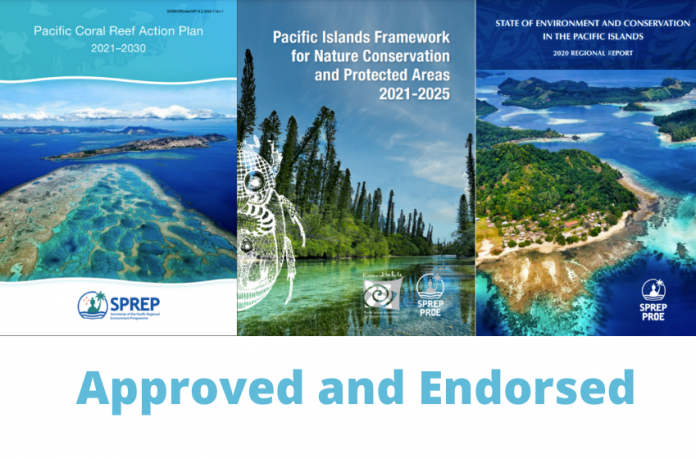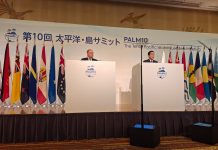Three key documents were endorsed by SPREP Member countries and territories during the second day of the 30th Secretariat of the Pacific Regional Environment Programme Meeting of Officials.
The documents were presented to the Members and observers by SPREP technical experts who had worked in collaboration with Member countries and partners to develop and approve the final versions of the documents.
The Pacific Islands Framework for Nature Conservation and Protected Areas 2021-2025 is the principal regional document for environmental conservation in the Pacific. Its purpose is to provide broad strategic guidance for nature conservation planning, prioritisation, and implementation in the Pacific region, and reflects the urgent need for transformative action in response to the multiple accelerating threats that are faced by nature and people in the Pacific.
The Framework has been reviewed, discussed and endorsed by the participants of the 10th Pacific Islands Conference on Nature Conservation and Protected Areas which convened virtually in November 2020. It identified key regional priorities for action that are needed to make progress towards the 30-year Vision, Mission and Goals for conservation that were adopted by Pacific leaders at the 7th Conference held in Rarotonga, Cook Islands. These regional priorities are presented in the Framework in the form of six Strategic Objectives.
The Strategic Objectives and Action Tracks were endorsed during the High-Level session of the Conference, with commitments to action by Pacific islands countries articulated through the Vemoore Declaration, which also forms part of the Framework.
The Framework also provides on Overview of Best Practices as guidance for work undertaken within each Action Track. It includes notes on the various responsibilities of stakeholders in its implementation, on governance arrangements, and on monitoring and reporting of regional progress.
The Pacific Coral Reef Action Plan 2021-2030 was also presented for endorsement by SPREP Members, and seeking their commitment to implement in a cross-sectoral and collaborative way as a matter of urgency to the region.
The Pacific is home to approximately 25 percent of the world’s corals. Coral reefs are arguably the most important ecosystem for the livelihoods and sustainable existence of Pacific island communities but they are under increasing pressure from climate change, water quality, ocean acidification and harvesting pressures.
The regional Pacific Coral Reef Action Plan identifies the major threats to coral reefs and associated ecosystems across the Pacific, identifies impediments to successful coral reef action, and identifies eight strategic action areas for which regional actions can provide economies of scale or other benefits to Member countries.
The Plan has been developed in consultation with Member countries and territories, Council of Regional Organisations of the Pacific (CROP) agencies, civil society, and the scientific community.
The final document which was presented to Members for approval was the first regional State of Environment and Conservation (SOEC) report. The report was adopted by the participants of the 10th Pacific Nature Conservation.
The report reflects an indicator-based reporting process for 31 conservation and environment indicators and was developed to inform planning and decision-making actions addressing environmental issues prioritised by SPREP Members.
It provides key information for the development of regional policies and gives guidance to the Pacific 2050 Strategy and other regional frameworks. It also supports SPREP Member countries and partners on periodic monitoring and reporting to international and regional Multilateral Environment Agreements, the Sustainable Development Goals, and can also be used to address today’s environment challenges.
SPREP Director General, Kosi Latu says, “This is a great achievement for not only the Secretariat and its Members but for the Pacific environment. I would like to congratulate all who were involved in these documents – from the developing stage to the approvals and finally the endorsements. These will go a long way in ensuring that our Pacific island countries are better equipped and able to foster a resilient Pacific environment for today and the future.
For more information on the Pacific Islands Framework on Nature Conservation, please contact Ms Amanda Wheatley, Biodiversity Adviser at amandaw@sprep.org
SOURCE: SPREP/PACNEWS


















